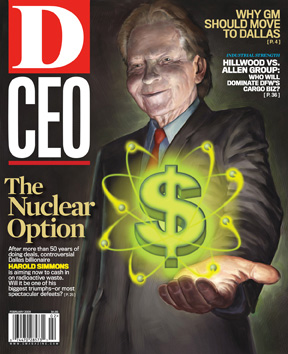October was barely under way when The Wall Street Journal ran an article headlined “Allaying Workers’ Fears During Uncertain Times,” which advised management to “communicate often.”
How, though? And, saying what?
According to a survey finding by global PR firm Weber Shandwick, there is “a clear deficit in the workplace between employee appetite for more communication on the impact of the economic crisis, and the levels at which company leadership is providing information.”
C-suite residents also are very concerned about communicating, even though, as Roger Frizzell, vice president of corporate communications at American Airlines parent AMR, says, “We really don’t know what impact the financial crisis may have on our business at this point.”
A lot of the communication may be informal, but Douglas Adams, new president of the Dallas Symphony Orchestra, says that at the DSO communication is still “deliberate at the management level.”
At Crosstex, a large midstream energy services company where rapid growth means it gobbles up capital, a precipitous drop in the firm’s stock price could affect a number of projects. To allay fears, chairman, president, and CEO Barry Davis launched a “100-Day Plan.”
“We cannot predict the extent of the challenges or the impact of things to come, so this is to make sure we are doing all we can,” Davis explains. “We want a sense of focus and urgency. I want to use this as an opportunity to improve our fundamentals and our financial margin. This will help us face the challenges during the downturn and be an even better company when we come out on the other side, which we will.”
Davis says he wants each employee to know that “he or she plays a vital role” over the next 100 days. Via e-mail, meetings , and V-minutes (video messages where he talks earnestly to employees), Davis reminds employees to “hang on, because no graph goes up or down forever.”
The team at American Airlines says that, paradoxically, they may be ahead of the game because they’ve had a full-court press talking to employees, customers, and the financial community about the “tremendous spike in the price of fuel” with a campaign called Fuel Smart. The company has reached out to employees with a quarterly letter, videos, and town hall-type meetings called President’s Conferences.
Frizzell says the impact of the broader financial situation will begin with the quarterly financial results and a conversation with the analysts who follow the company, and then will be quickly translated to their other audiences—just the way information on the fuel issue was handled.
These organizations may not be able to predict the impact of the financial crisis, but one clear message they want audiences to hear, as Adams says, is that they are “aggressively looking for ways to manage through the downturn.” And as for the platitudinous idea that, as Barry Davis notes, tough times always have a positive side, Adams says, “In past downturns, people who had not been previously active stepped up.”
The way to quell the rumor mill and maintain focus is to have employees and customers feel “they are actively committed to the mission,” Adams says. And to do that, communicate as often as possible, even if you don’t know the answers, and along every channel you can find.
—Merrie Spaeth
Spaeth is one of the country’s leading communications strategists. After serving as President Ronald Reagan’s director of media relations, she founded Dallas-based Spaeth Communications in 1987. She is also a lecturer at Southern Methodist University’s Cox School of Business.
DOWNTURN NEEDN’T SLOW YOU DOWN
The economy has gone to hell in a handbasket.Time to sharpen the guillotine, Robespierre?
Not so fast, says SMU professor of marketing Dan Howard, who recommends the following counterintuitive steps:
Increase the amount of money spent on promoting your company.
“Most people think opposite; they cut adverting,” Howard says. “But if advertising is supposed to stimulate sales, if you have a downturn, that’s the last thing you should do.”
Increase/improve your sales force.
“Costs are relative to your gain or your revenues, and by hiring excellent people who have been sacked by other companies, you’ll greatly increase your … sales.”
Now that competitors are on their knees, look at buying opportunities in order to increase your market share.
“CEOs who really know what they’re doing, in order to gain market share, buy up other companies.”
Don’t cancel office parties or lunches to save dimes.
“You don’t want to cut costs by ruining the morale of the office.” —Dave Moore





